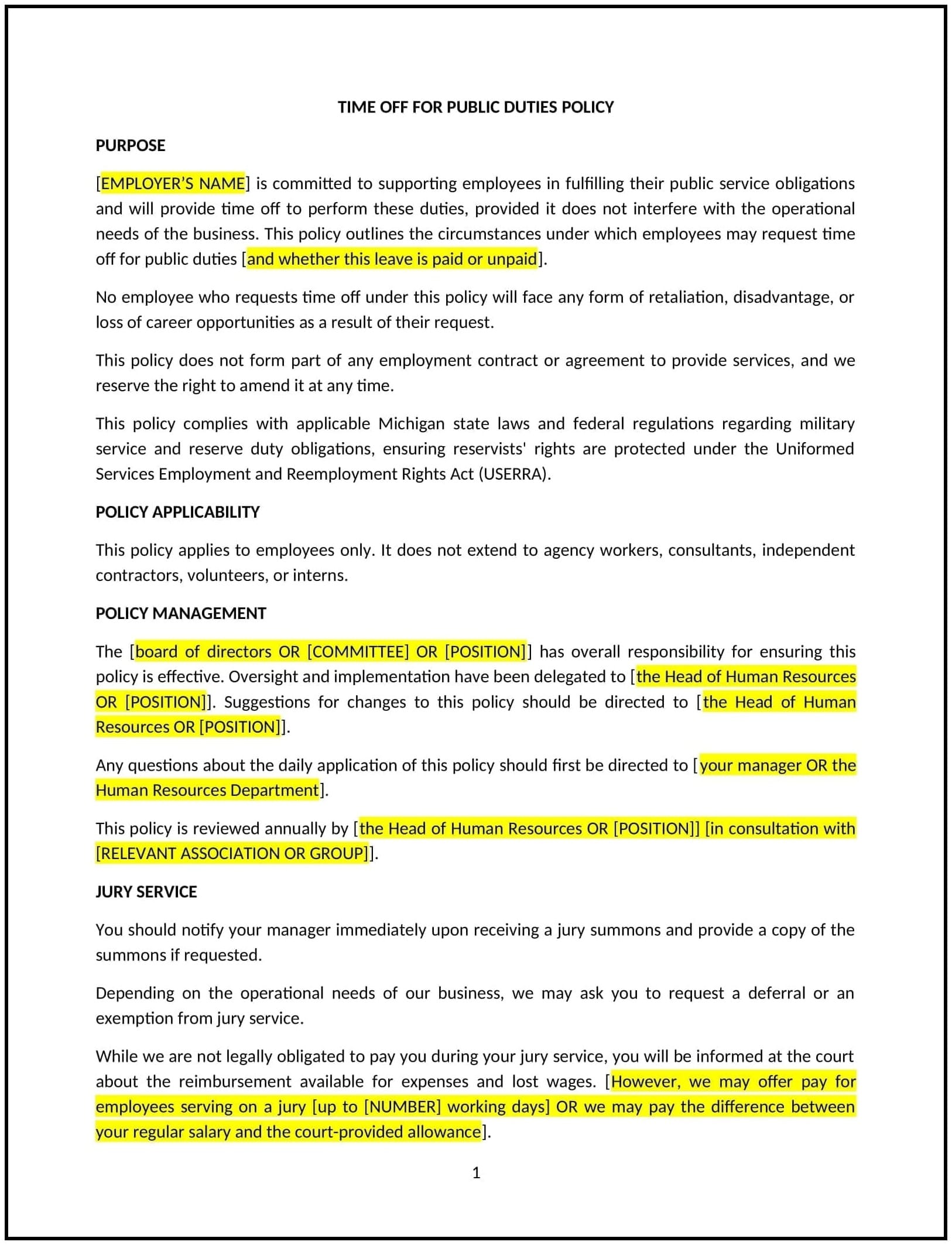Time off for public duties policy (Michigan): Free template
Got contracts to review? While you're here for policies, let Cobrief make contract review effortless—start your free review now.

Customize this template for free
Time off for public duties policy (Michigan)
A time off for public duties policy provides Michigan businesses with guidelines for granting time off to employees who need to fulfill public responsibilities, such as jury duty, voting, military service, or other civic duties. This policy outlines the procedures for requesting time off, the eligibility criteria, and the business's approach to managing employee absences for public duties. It ensures that employees can fulfill these important obligations without negatively affecting their work performance or facing financial hardship.
By implementing this policy, businesses can support civic participation, maintain compliance with Michigan state laws, and ensure that employees are able to meet their civic responsibilities while continuing to contribute to the business.
How to use this time off for public duties policy (Michigan)
- Define public duties: Clearly specify what qualifies as public duties under the policy, including jury duty, voting, serving as a witness, or participating in other civic obligations. The policy should outline the types of public duties eligible for time off and any exclusions.
- Set eligibility criteria: Specify which employees are eligible for time off to fulfill public duties, such as full-time versus part-time employees, and whether there are any length-of-service requirements.
- Outline the process for requesting time off: Establish how employees should request time off for public duties, including how much notice is required, whether documentation (e.g., jury duty summons) is necessary, and the procedure for submitting requests.
- Address compensation: Clarify whether employees will be paid for time off for public duties. For example, some businesses may provide full pay for jury duty or other public obligations, while others may offer unpaid time off or allow employees to use paid leave (such as PTO or vacation days).
- Protect job security: Ensure that employees can return to their regular job or a similar position after completing their public duties, and outline any procedures for reinstating employees who are absent for extended periods.
- Accommodate scheduling conflicts: Outline how the business will handle potential scheduling conflicts if multiple employees request time off for public duties at the same time. This may include prioritizing certain roles, offering flexible hours, or temporarily redistributing work responsibilities.
- Comply with Michigan state laws: The policy should align with Michigan state laws regarding public duties leave, such as the Michigan Jury Duty Leave Act, which provides job protection for employees called for jury duty.
- Review and update regularly: Periodically review and update the policy to ensure it remains compliant with Michigan state laws and reflects any changes in business practices or employee needs.
Benefits of using this time off for public duties policy (Michigan)
This policy provides several key benefits for Michigan businesses:
- Promotes civic participation: The policy encourages employees to fulfill their civic responsibilities, such as serving on a jury or participating in elections, without the fear of losing their income or job.
- Ensures legal compliance: The policy helps businesses comply with Michigan state laws regarding time off for public duties, reducing the risk of legal claims related to failure to accommodate employees' public duties.
- Enhances employee satisfaction: Offering time off for public duties demonstrates that the business values employees’ contributions to society, which can improve employee morale and job satisfaction.
- Reduces absenteeism: By providing clear guidelines for taking time off for public duties, businesses can manage employee absences more effectively and ensure minimal disruption to operations.
- Supports work-life balance: This policy supports employees in balancing their work responsibilities with their civic obligations, contributing to a healthy work-life balance.
- Boosts business reputation: A business that supports employees’ civic duties is likely to be viewed positively by the public and employees, enhancing its reputation as a responsible and supportive employer.
Tips for using this time off for public duties policy (Michigan)
- Communicate the policy clearly: Ensure all employees are aware of the time off for public duties policy by including it in the employee handbook, during onboarding, and in regular updates about leave policies.
- Streamline the request process: Make it easy for employees to request time off for public duties by providing clear instructions and a simple process for submitting documentation or requests.
- Monitor and manage employee absences: Keep track of time off requests for public duties to ensure that business operations continue smoothly. Implement a system for managing absences and coordinating with other employees to cover essential tasks.
- Ensure flexibility: Be flexible with scheduling when possible, especially if multiple employees need time off at the same time. Offer accommodations, such as temporary shifts or work-from-home options, to maintain productivity during peak absenteeism periods.
- Review the policy regularly: Regularly assess the policy to ensure it remains compliant with Michigan state laws, business practices, and employee needs. Make any necessary updates to reflect changes in regulations or employee circumstances.